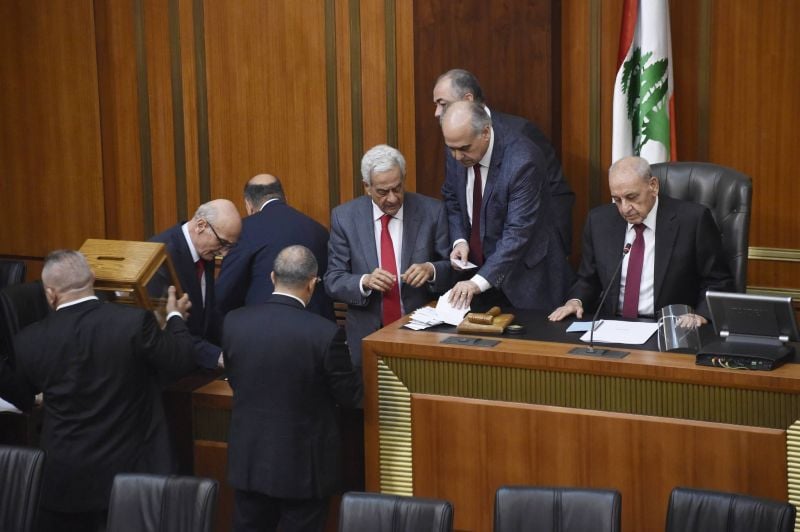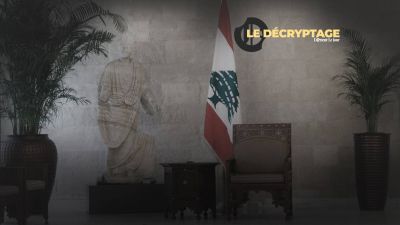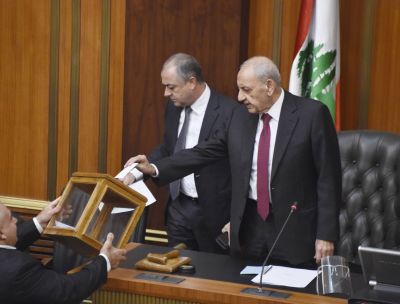
The tenth presidential election session in the Lebanese Parliament, on Dec. 15, 2022. (Credit: Ali Fawaz/Lebanese Parliament)
The tenth parliamentary session devoted to electing Lebanon's next president was adjourned Thursday, less than an hour after it began, without reaching a result. No new sessions have been fixed by Parliament Speaker Nabih Berri.
As in previous weeks, Berri barely waited until the first-round votes were counted before adjourning the session, after several members left the chamber.
This ritual of a first round followed by the direct adjournment of the session — the quorum having been lost after the departure of Hezbollah, the Amal Movement and Free Patriotic Movement MPs — has been repeated at electoral sessions since the first such parliamentary meeting on Sept. 29, despite Lebanon's ongoing dual executive power vacuum.
Shortly before the meeting began, the attendance quorum of two-thirds (86 MPs out of 128) was reached, with 11 officially excused for their absence.
In the first round, a total of 109 MPs voted. Thirty-eight voted for Zgharta MP Michel Moawad (he received 39 votes during the previous session) and 37 cast blank ballots (39 during the last session).
Among the other candidates who received votes, professor and academic Issam Khalifeh got eight votes (five votes during the last session) and former minister Ziyad Baroud two (one vote during the last session).
Meanwhile, six MPs voted for "The New Lebanon," two for ex-MP and official candidate Salah Honein (one during the last session). Nine votes went for "The Pact", two for "The Agreement", one for official candidate Miled Bou Malhab, and one for Chafic Merhi, an ex-port customs official currently in detention.
Three ballots were canceled, one of which contained the name of Martin Luther King, who was one of the most prominent leaders in the civil rights movement in the United States.
Sleiman Frangieh's name, which slipped into the ballot box four weeks ago, did not emerge this Thursday.
In the first round, a candidate needs 86 votes (a two-thirds majority) to be deemed elected, while an absolute majority of 65 votes is required in subsequent voting rounds.
However, in previous sessions, Parliament did not reach a second round of voting, as members of the Hezbollah camp and their allies withdrew after the first round vote count, leading to the loss of the quorum each time.
At each new session, Berri considers that it is again a first round and that the number of votes required is 86. However, some MPs challenge this procedure as unconstitutional, saying that after the initial voting round at the electoral session on Sept. 29 all subsequent rounds of voting should require just a simple majority for a candidate to secure election.
Meanwhile, since Michel Aoun's presidential term ended Oct. 31, the country has been faced with a dual executive power vacuum for the first time in its history, with Najib Mikati's cabinet serving only in a caretaker capacity since it assumed the status following May's legislative elections.
This session was the last of 2022.
'Numbers don’t mean anything'
Asked about Moawad winning more votes than the number of blank ballots cast, Hezbollah MP Ali Fayad told Al Jadeed: "In my opinion these numbers don’t mean anything … some of the parties are thinking it’s a transitional phase while some are having fun. It is not serious yet."
"The Lebanese are paying the price of the absence of a president, with each passing day," Moawad said as he left the session. "What happened today, with this lightness and tone of joking, shows a disrespect for the political function and the pain of the Lebanese," he added.
"The opposition forces must assume their responsibilities and unite. As long as we are dispersed, we can't do anything," the Zgharta MP said. "I will take advantage of these three upcoming weeks to continue my contacts with the political forces. I hope that there will be a new president at the beginning of the year," he concluded.
Amal MP Ali Hassan Khalil, for his part, said that Parliament Speaker Nabih Berri "will continue with his calls for Parliament to convene to elect a president after New Year's Eve." He also said his party "did not hear a decisive stance on any of the [presidential] candidates from any [foreign country]."
"Unfortunately, there is a culture of obstruction that is taking hold," Ibrahim Mneimneh, Forces of change MP, said.
"The traditional forces are exhausted. We [MPs] give a sorry spectacle," Forces of Change bloc MP Melhem Khalaf said as he left Parliament.
"Any idea that does not come from the National Pact … harms the Lebanese model. Why does Mikati accept for himself what he denies to others?" FPM MP Ghassan Atallah said after the session. "We can't go on like this. We must have a dialogue," he continued. Atallah was criticizing Mikati's decision to hold a cabinet meeting last week during the presidential vacuum.
Berri intended to convert the meeting of the Parliament into a dialogue table in order to find a compromise on the presidential election, but the initiative fell through. This was due to the reluctance of the main Christian parties — both the Lebanese Forces and the Free Patriotic Movement — which showed little enthusiasm for his approach.
Hezbollah has made it clear that its preferred candidate is Sleiman Frangieh, leader of the Marada Movement and rival of the FPM, whose MPs are not ready to give him their votes.
After meeting with Berri, Deputy Speaker Elias Bou Saab said Wednesday that "there will be no dialogue" regarding the presidential election before the end of the year. Their meeting came as Bou Saab had just returned from a visit to Qatar, where he met with several officials.
Over the weekend, the commander-in-chief of the Lebanese Army, General Joseph Aoun, was received by several high-ranking officials in Doha. A trip seen as a "political message that his candidacy for the presidency has the support of Qatar," an Arab diplomat told L'Orient-Le Jour.

